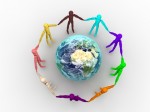The Disconnection between Social Conscience and Social Consciousness. (Or, How Socially Conscious Are You?)
Social conscience, social consciousness: It isnāt all the same, dear!
Over the past few years, Iāve met a number of people who describe themselves as āsocially consciousā. When asked what they mean by that, they usually say they are concerned about the various global and local social, economic, and environmental injustices that exist in the world and want to help create a more socially just, environmentally sustainable world. This definition more accurately describes what it means to have a social conscience, rather than what it means to be āsocially consciousā, but itās all good, isnāt it?
In a word, ānoā: Although we use the terms āsocial conscienceā and āsocial consciousnessā interchangeably, they are not the same thing. So, what does it mean to be socially conscious? It means being aware of how our own economic and social circumstances (a.k.a., socio-economic class, āprivilegeā), our ideologies (political or spiritual) and values shape both our understanding of social issues and social injustices and how we respond to them.
Being socially conscious means applying a critical lens to the material we read and the stories we hear through various sourcesāmass media (and alternate media), the entertainment industry, educationāabout social issues. It means taking a step back and examining how our own understanding of social issues and solutions has been subtly influenced by the types and sources of information we consume.
It means critically analyzing how we frame our comments in response to the stories we read and the information we post on social media platforms. Is our comment likely to help or hinder social justice advocates and social change agents who are seeking to bring about change, peacefully and democratically, from the ground up? It also means being conscious of how we reply to others who comment on our posts about social justice issues.
Do we create a space that encourages a conversation (and sometimes lively debate) with others who offer a different perspective on the matter, or who may have expertise or experience in that area and invite us to rethink or expand our position? Or do we shut them down and send the message that we are really more interested in appearing to be socially conscious than actually raising our, and our friendsā social consciousness? This matters because social media can be a powerful tool for social change, but too often there is too little emphasis on the āsocialā and way too much emphasis on the āmeā in āsocial mediaā.
Ā
The disconnection goes digital
Based on comments and posts Iāve seen on various social media platforms over the past few years, there appears to be a myriad of individuals with a social conscience, but more often than not, the type of social awareness and the critical thinking skills Iāve outlined above are missing in action. From what Iāve seen it appears that itās entirely possible to have a social conscience while simultaneously lacking a well-developed social consciousness.
When the disconnection between social conscience and social consciousness overrides good intentions and compassion, it leads to some awkward, unintended consequences, including (1) posting comments that are inadvertently insensitive to the victims of ongoing structural inequalities and oppressions; and (2) unwittingly frustrating other activistsā campaigns to bring about social change.
I recently encountered an example of this disconnection between social conscience, social consciousness and social action on social media. An acquaintance had posted a short video on global economic injustices (produced by a coalition of activists) that ended with a clear call to action: We need to change the rules.
Rather than encouraging her followers to check out the coalitionās website or inviting her followers to talk about the issue in more depth, my acquaintance dismissed the call to action with a comment: We donāt need to change the rulesāwe just need to be more ethical and compassionate. I wondered if she realized that by contradicting the coalitionās call to action she not only downplayed the seriousness of the issue but was also inadvertently supporting the perpetuation of the existing system and rules. It struck me that there was a disconnection between the central message of the video and her comments.
How are we to put an end to global economic injustices if we donāt step up and push our elected politicians to change the rulesāor better yet, the systemsāthat have created and maintained these inequalities. How does saying that āwe just have to be more compassionate and ethicalā improve life for people whose day-to-day lives are shaped by these economic injustices? It doesnātāunless ethical, compassionate people who are morally outraged by these economic disparities stand up and take concrete actions to change the rules and the system.
āIt’s the action … that’s important. ā¦ You may never know what results come from your action. But if you do nothing, there will be no result.ā Mahatma Gandhi (Goodreads, āQuotes about Activismā. http://www.goodreads.com/quotes/tag/activism, accessed August 12, 2015.) Read the rest of this post »
 October 10, 2015
Ā·
October 10, 2015
Ā·  Susan Ā·
Susan Ā·  7 Comments
7 Comments
 Posted in: Social Justice
Posted in: Social Justice

